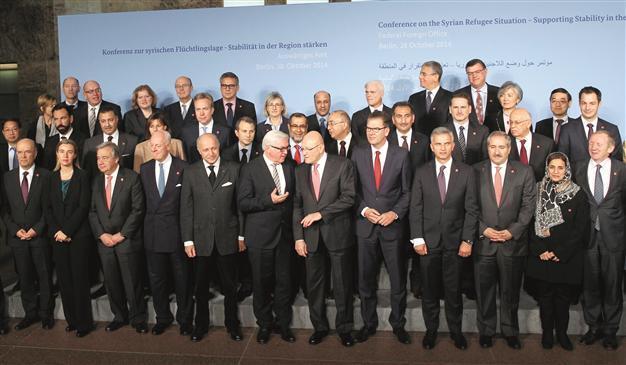Syria’s neighbors call for help with refugee flood
BERLIN

AA Photo
Syria’s neighbors have urged the international community, particularly European countries, to open their doors to more refugees from the three-and-a-half-year civil war, and for immediate financial and technological help as their infrastructures buckle under the massive influx of civilians fleeing the conflict.More than 3 million people have fled Syria because of the conflict that began in March 2011, with most taking shelter in Lebanon, Jordan, Turkey and Iraq. Another 6 million are displaced within Syria.
Turkey has warned the international community that new humanitarian disasters in Syria could erupt through the increased brutality of the Bashar al-Assad regime and the growing threat of the Islamic State of Iraq and the Levant (ISIL).
“We are facing the risk of further humanitarian disasters and continued large-scale movements of Syrians toward our borders,” Turkish Deputy Foreign Minister Naci Koru told a Berlin conference of foreign ministers and representatives from 40 countries that the status quo was unsustainable.
Koru also complained about “the lack of sufficient support from the international community.”
“Today, the total number of Syrians hosted in Turkey exceeds 1.6 million. The cost for Turkey has so far been over $4 billion. The contribution that we have received from the international community – only $250 million – has fallen significantly short of our expectations,” he stated.
“The neighboring countries, including Turkey, have, to date, had to shoulder an unfair share of the humanitarian burden resulting from the conflict in Syria,” said the deputy foreign minister.
“In a spirit of partnership, we are in need of equitable and meaningful burden-sharing by the international community.”
Germany convened the one-day conference to focus not only on the refugees’ humanitarian needs, but on the wider necessity to shore up the stability of host countries struggling to cope with the exodus.
Several foreign ministers and other representatives from around 40 countries and international bodies attended the talks.
Tammam Salam, the prime minister of Lebanon, which has taken on some 1.1 million refugees despite the 4.5 million population of its own, said in addition to placing huge strains on the country’s hospitals, schools and other institutions, the refugees also are taking jobs from Lebanese workers, creating resentment.
“The massive influx of Syrians into poor communities totally unprepared to cope with such a sudden burden has had a destabilizing effect, with a variety of challenges and threats that constitute a fertile ground for extremism and violence,” he said.
U.N. High Commissioner for Refugees Antonio Guterres also told the conference that the impact of 3 million Syrians having fled the long and bloody conflict was “enormous” on its neighbors.
“Economics, public services, the social fabric of communities and the welfare of families are all affected, not to mention the security impact of the Syrian conflict in the whole region,” he told the gathering.
German Foreign Minister Frank-Walter Steinmeier, who organized the one-day conference, said in addition to easing the hardships of the refugees themselves, the focus needed to be on international investment in hospitals, schools, water supplies and waste disposal systems in the neighboring countries.
“This is not only a question of more money,” he said. “We also need to use the funding more effectively and more sustainably.”
He noted that Germany has taken in some 70,000 Syrians since 2012, but remains willing to do more. “We hear the call from host countries to reduce the number of refugees,” he said.
















